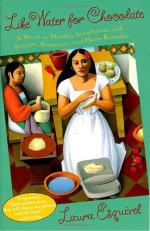|
This section contains 4,812 words (approx. 17 pages at 300 words per page) |

|
SOURCE: “Romancing the Cook: Parodic Consumption of Popular Romance Myths in Como agua para chocolate,” in Latin American Literary Review, Vol. 24, No. 48, July, 1996, pp. 56–66.
In the following essay, Dobrian states that through the use of parody in Como agua para chocolate, Esquivel is not ridiculing romance novels, she is denouncing the male-domination in society that makes women want to read romance novels.
Laura Esquivel’s Como agua para chocolate represents a parody of popular myths that, by encapsulating female characters within formulaic and prescriptive roles, strive to eliminate feminine diversity and individuality. Several critics have noted that Esquivel utilizes the double strategy of inscribing certain codes and then waging an assault on these very constructs. As Beatriz González Stephan summarizes, Esquivel situates her narrative “sobre los discursos autoritarios de la represión y el poder en todas sus dimensiones, y sobre una nueva perspectiva que transgrede el...
|
This section contains 4,812 words (approx. 17 pages at 300 words per page) |

|


